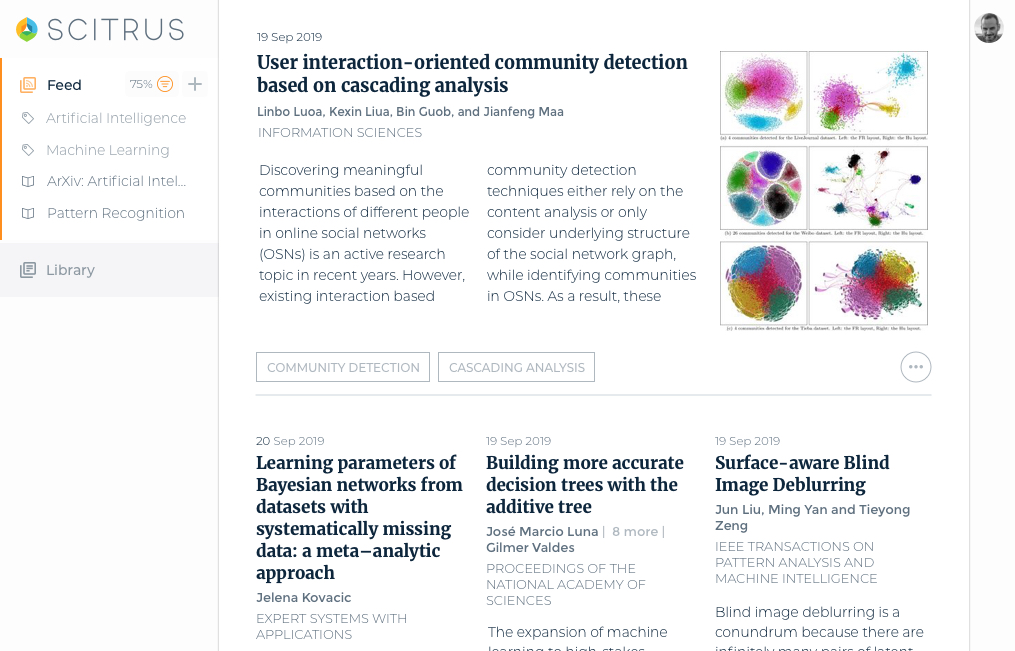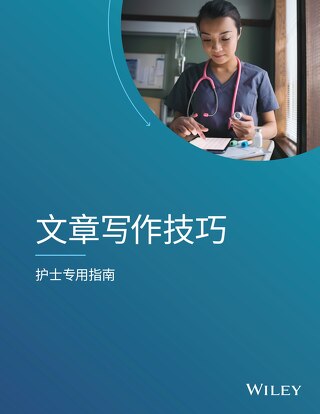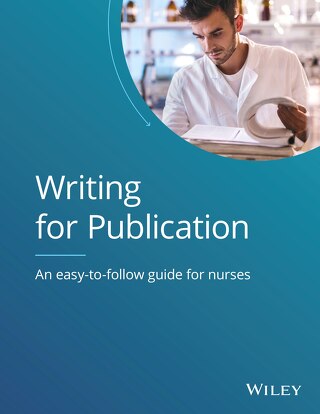how-to-easily-access-the-most-relevant-research
October 01, 2019
Today, Atypon announced the launch of Scitrus, a new, personalized web app that allows researchers and practitioners to follow topics, journals, authors, and more to create a customized feed of the latest research. The free site adapts to users’ interests based on their preferences and interactions with the site, bringing them the most relevant and newest content each time they visit.
Nikolaos (“Nikos”) Nanas, a researcher with a PhD in Artificial Intelligence, developed the initial AI model that would eventually become Scitrus. We recently spoke to him to learn more.
Q. In your time as a researcher, how did you follow the latest research in your field? Did you find it hard to keep up with?
A. It was hard indeed, but not as hard as it is today. The field of Artificial Intelligence was already moving fast and the means to stay on top of it were limited. I still had to go to the university library and photocopy dozens of papers just to throw away most of them as irrelevant to my focus of research. I could not easily discover other researchers doing research in my niche or come across relevant research in related fields. I had to restrict my reading to a close circle of researchers, the conferences I attended, and a few journals I trusted. Today, it is much different. There is easy access to an abundance of academic resources, to the extent that it becomes unmanageable. Back then, search was possibly enough. Now, we need an additional level of filtering to increase relevance and trust.
Q. What inspired you to use your background in Artificial Intelligence to create a resource for research publications?
A. It was a long journey. When I started my PhD in 2000, "Information Overload" was already a concern, starting with emails and moving to online news. Inspired by the biological immune system, I came up with "Nootropia," an algorithm for Adaptive Information Filtering to tackle Information Overload. The goal was to evaluate each information item in a stream, according to the multiple and evolving interests of an individual or a group. After a series of promising experiments, I decided to put Nootropia into action. In 2009, as a researcher at the Center for Research and Technology of Thessaly (Greece), my team and I developed a research prototype, possibly one of the first personalized aggregators for both news and scientific papers. User studies revealed that Nootropia was accurate enough, but the user experience was terrible. In 2011, with Christos Spiliopoulos, we founded Noowit, a startup which, with Nootropia at its core, developed a platform for reading and publishing intelligent online magazines that adapted to the interests of each individual. Turns out that content personalization is not that critical when it comes to everyday news. The average individual does not have very specific interests when it comes to news. However, it is absolutely critical for research, since every researcher has various levels of interest in niche knowledge domains and no two researchers are alike in their interests! So, as part of Atypon and Wiley, we are glad to apply these technologies to the academic domain. We are solving a serious real-world problem.

Q. How does Scitrus differ from other content aggregators?
A. Scitrus combines both the smarts and the looks. One of the first lessons I learned from those early research efforts was that even the most accurate algorithm will not be adopted by real users if it is not wrapped up in an appealing and user-friendly interface. It was made clear that, unlike search, the personalization of real-time content, i.e., papers and news that have just been published in the case of Scitrus, cannot be treated simply as a ranked list of documents. We had to find a way to combine relevance with publication time in a single stream of information. For similar reasons, Collaborative Filtering techniques that have been broadly applied for recommending music and movies, and have also been adopted by many researcher apps to produce paper suggestions, cannot be easily applied in the case of papers that have just been published. The social cues (views, shares, etc.) that these algorithms rely on are just not there yet.
With Scitrus, we have managed to combine Artificial Intelligence with design to tackle all of the above. As a researcher, you can easily follow your favorite topics, journals, and authors to produce a real-time feed of everything relevant and new being published. So far, the process has been similar to creating a search or eToC alert, but with Scitrus we go a step further. Every paper and news article we aggregate is evaluated according to the specific interests of the research and is assigned a relevance score. We use this score not only to filter out the least relevant papers (if the user activates the feed filter) but also to highlight the most relevant papers in the feed itself. We have built an amazing layout engine that allows us to combine freshness with relevance in the best possible way, but also to offer an impeccable reading experience that helps the researcher easily identify and consume the content that matters.
Q. Finding research that is credible and avoiding questionable sources is increasingly important. Do you see Scitrus as helping to combat misinformation?
A. This is indeed an issue. So far Scitrus is focusing more on identifying the positive rather than the negative. This is already a good way to distinguish interesting and valuable research from less interesting or credible, but it turns out that it is not enough. Unlike my research days, the issue of credibility and trust has nowadays become pertinent. We are already filtering out sources (journals) that are deemed unreliable by the community. We are experimenting with applying our underlying algorithms to identify not only what the user is interested in, but also what the user dislikes. We are also looking into ways of measuring or estimating the global value of a paper the moment it is published. We have more relevant ideas in mind and we will roll them out progressively and in accordance to user feedback and data. Scitrus will become more and more a trusted source of valuable and relevant academic content.
Q. How do you envision Scitrus fitting into the typical researcher’s work?
A. I want Scitrus to stay open in every researcher and practitioner’s browser, to make staying on top of developments in any field a daily and pleasant process. Scitrus and discovery of relevant research is only one aspect of Atypon's effort to facilitate the creation and dissemination of knowledge. We are launching Scitrus together with Manuscripts, the collaborative, academic editor of the future. A revised version of RemarQ is also underway and they are all tied up together with Connect, a single account for accessing all the academic resources and applications a researcher needs. Exciting research times ahead of us. Stay tuned!
Visit www.scitrus.com and register for your free profile today!












